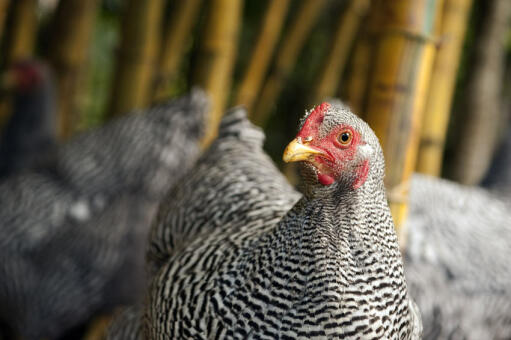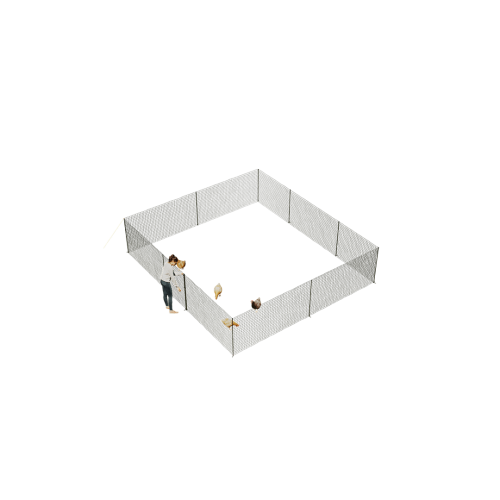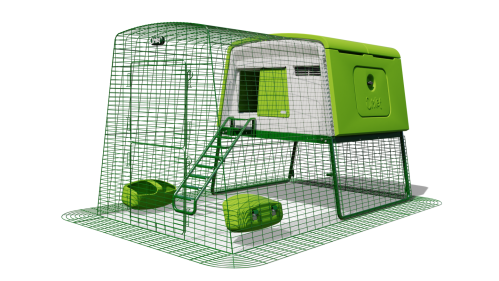Dominique Chickens
Breed Rating (7 Reviews)
| Appearance | |
| Friendliness | |
| Hardiness | |
| Egg | |
| Garden |
Dominique History
Dominique Behaviour
Dominique Pictures
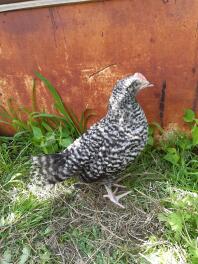
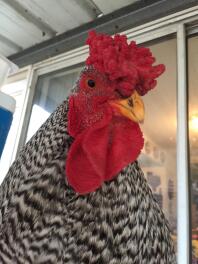
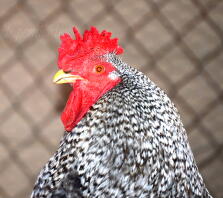
Dominique For Sale
Latest Reviews For Dominique (5 of 7)
Love them - Nancy,
My 3 Dominiques are pets and would rather hang out with me than with the other chickens. I love them!!
WE GOT MORE DOM PULLETS - Sylvester017,
4 years ago we lost our one sweet Dom pullet chick and now we're back to having Doms again. 3 adorable curious outgoing unafraid chicks that keep each other company and adapt very quickly to human handling. Calm, talkative, funny, and I can't wait for their brown eggs by next year! We had a humid summer and didn't use a heat lamp for the chicks but the littlest one still got pasty butt for a couple days -- she's okay now doing a good job of keeping up the pace with the two other slightly larger chicks. I don't think they are from the same-day hatch -- they're hatchery chicks from the local feed store so I can't be certain of ages. They've evened up in size after a couple weeks. These are great calm family-friendly, flock-friendly birds for the backyard.
Wonderful, entertaining, and funny birds - Nadja,
Dominiques are wonderful, entertaining, and funny birds. We have both LF and Bantams. I originally got them because I was sick and tired of listening to "chicken snobs" bragging about paying a fortune for chicks and belittling those with hatchery birds. So, I decided that sense some of my ancestors fought in the American Revolution, and that and Mayflower descent are considered high status ancestries here in the USA, that my chickens should have equal claim to snobbery. I have never regretted the decision. They are charming, funny birds. There is nothing funnier than watching a Dominique hen go airborne and manage to fly for twenty feet or more up to the back deck when one emerges from the house with treats. They run as if pursued by Old Nick himself if you try to pick them up; but if you sit and read or relax quietly they are soon sitting on your feet and surrounding and under your chair. They sometimes seem to have a hive mind and all have the same idea at the same time, which can be hilarious. They follow you around, with an abounding interest in whatever you are doing, and with the never destroyed hope that everything and anything you do will result in a treat for biddy. They are hardy, tough, and not prone to fighting as adults - although pullet battles can be a bit gamey, and cause one to think that ones pullets are actually cockerels. They aren't; they simply have dramatic fights where by some apparent miracle, no chicken is injured.
Great breed! - Robin,
I found a picture of my grandma in the 1920's with a flock of chickens. I took it to my farm store and a man identified the flock as Dominiques. I wanted to honor my grandmother since I never really knew her by getting my own flock, I ordered 15 from Cackle Hatchery in Missouri, they threw in 2 extra. all 17 survived, after 3 years I am down to only 5. I call them the Fab Five. They are all out at our county fair this week for the 4 H poultry show, my 8 year old son is using them for his poultry project. They have always been calm, friendly and good egg layers. I love when they see me carrying the feed pail, they all run down the hill to me!
Our most reliable breed - Dee,
Our 1st chickens were Dominiques. Years later we have 11 breeds, but hubby's fave is the Doms. They are not as visually striking as some breeds, but are super friendly, even the roosters. They are protective of the hens even from hawks ( the hawk lost the fight and hasn't come back). We have cats, Pomeranians, German shepherds, goats etc, and nothing phases them. They are our most reliable layers even through winter in an unheated, unlit barn. 6-7 eggs per week until they were about 4 years old, now about half that. They are excellent foragers, very hardy. We are planning on getting some more to add to our breeding program. You won't be disappointed! We crossed some with our Americaunas and got our own cream-leghorn type, even seems to autosex!

